Enwc 201 exam 1 - Study guides, Class notes & Summaries
Looking for the best study guides, study notes and summaries about Enwc 201 exam 1? On this page you'll find 54 study documents about Enwc 201 exam 1.
Page 4 out of 54 results
Sort by
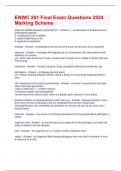
-
ENWC 201 Final Exam Questions 2024 Marking Scheme
- Exam (elaborations) • 15 pages • 2024
- Available in package deal
-
- $11.99
- + learn more
ENWC 201 Final Exam Questions 2024 Marking Scheme what are wildlife diseases connected to? - Answer -1. conservation of threatened and endangered species 2. recreational use of wildlife 3. public health/loss of life 4. agriculture (livestock) disease - Answer --a disturbance to the normal function of structure of an organism epizootic - Answer --a disease that appears at an unexpected rate, synonymous with epidemic in humans -ex: white-nose syndrome in bats; causes them to wake up i...
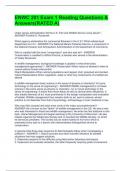
-
ENWC 201 Exam 1 Reading Questions & Answers(RATED A)
- Exam (elaborations) • 10 pages • 2024
- Available in package deal
-
- $13.99
- + learn more
Under whose administration did the U.S. Fish and Wildlife Service come about? - ANSWER Franklin D. Roosevelt Which agency administers the commercial fisheries in the U.S.? What cabinet-level Department is it in? - ANSWER The National Marine Fisheries Service, a component of the National Oceanic and Atmospheric Administration in the Department of Commerce. Who is credited with the term "conservation" and who was he? - ANSWER Conservation is credited to Gifford Pinchot, a forester who serv...
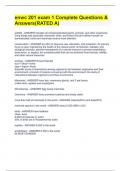
-
enwc 201 exam 1 Complete Questions & Answers(RATED A)
- Exam (elaborations) • 9 pages • 2024
- Available in package deal
-
- $12.99
- + learn more
wildlife - ANSWER includes all nondomesticated plants, animals, and other organisms; living things and especially mammals, birds, and fishes that are neither human nor domesticated; birds and mammals receive most attention conservation - ANSWER an ethic of resource use, allocation, and protection. Its primary focus is upon maintaining the health of the natural world: its fisheries, habitats, and biological diversity; planned managment of a natural resource to prevent exploitation, destruction...
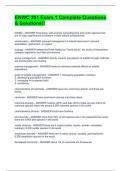
-
ENWC 201 Exam 1 Complete Questions & Solutions!!
- Exam (elaborations) • 8 pages • 2024
- Available in package deal
-
- $11.99
- + learn more
Wildlife - ANSWER Free-living, wild animals (excluding feral and exotic species) that are of major significance to humans in their natural environments conservation - ANSWER planned management of natural resources to prevent exploitation, destruction, or neglect ecology - ANSWER defined by Ernst Haekel as "home study"; the study of interactions between organisms and their environment active management - ANSWER directly impacts populations of wildlife through methods like translocation...
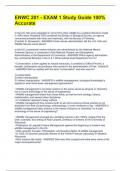
-
ENWC 201 - EXAM 1 Study Guide 100% Accurate
- Exam (elaborations) • 10 pages • 2024
- Available in package deal
-
- $12.99
- + learn more
In the US, fish were separated in name from other wildlife by a political decisions made in 1940 when President FDR combined the Bureau of Biological Survey, an agency concerned primarily with birds and mammals, with the Bureau of Fisheries (Franklin D. Roosevelt) - ANSWER Under whose administration did the U.S. Fish and Wildlife Service come about? In the US, commercial marine fisheries are administered by the National Marine Fisheries Service, a component of the National Oceanic and Atmosp...
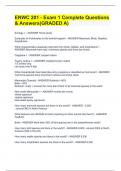
-
ENWC 201 - Exam 1 Complete Questions & Answers(GRADED A)
- Exam (elaborations) • 6 pages • 2024
- Available in package deal
-
- $9.99
- + learn more
Ecology = - ANSWER Home study Examples of Vertebrates in the animal kingdom - ANSWER Mammals, Birds, Reptiles, Amphibians What characteristics separate mammals from birds, reptiles, and amphibians? - ANSWER Mammals have hair, mammary glands and three ear bones Capybara = - ANSWER Largest rodent Pygmy Jerboa = - ANSWER smallest known rodent 1-2 inches long can jump over 9 feet
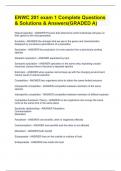
-
ENWC 201 exam 1 Complete Questions & Solutions & Answers(GRADED A)
- Exam (elaborations) • 7 pages • 2024
- Available in package deal
-
- $10.99
- + learn more
Natural selection - ANSWER Process that determines which individuals will pass on their genes to the next generation Evolution - ANSWER the changes that we see in the genes and characteristics displayed by successive generations of a population Speciation - ANSWER the production of a new species from a previously existing species Allopatric speciation - ANSWER separated by land Sympatric speciation - ANSWER speciation in the same area; exploiting unused resources causes them to becom...
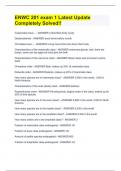
-
ENWC 201 exam 1 Latest Update Completely Solved!!
- Exam (elaborations) • 5 pages • 2024
- Available in package deal
-
- $9.99
- + learn more
Coelomates have... - ANSWER a fluid filled body cavity Deuterostomes - ANSWER anus forms before mouth Chordates have... - ANSWER a long nerve that runs down their body Characteristics of the mammalia class - ANSWER mammary glands, hair, three ear bones, some can lay eggs but most give live birth Characteristics of the carnivora order - ANSWER Sharp claws and prominent canine teeth

-
ENWC 201 exam 1 reading questions & Solutions(RATED A)
- Exam (elaborations) • 4 pages • 2024
- Available in package deal
-
- $9.99
- + learn more
What is wildlife? - ANSWER Free-living, wild animals (excluding feral or exotic species) of major significance to humans; includes associated plants and lower animals (micro-organisms) What is the difference between active and passive management? - ANSWER Active management= does something to the population (such as increasing or decreasing its size) in a direct manner through strategies like translocations or hunting Passive management= no active management occurs, but they are still managed...

Do you wonder why so many students wear nice clothes, have money to spare and enjoy tons of free time? Well, they sell on Stuvia! Imagine your study notes being downloaded a dozen times for $15 each. Every. Single. Day. Discover all about earning on Stuvia



